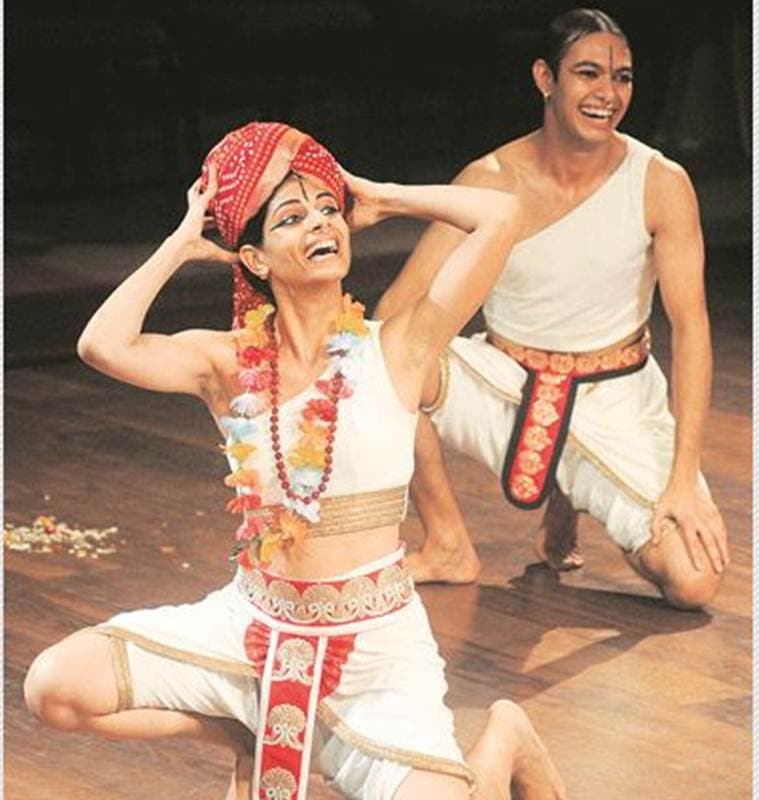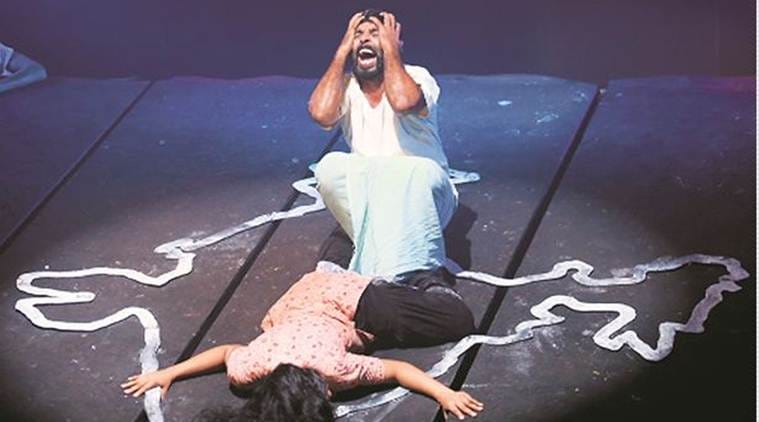 Scene from the play Muktidham
Scene from the play Muktidham
Muktidham – At a Hindu monastery in the 8th century, the ageing teacher, Nath Nand, is about to retire. Before that, he must choose a successor from two disciples — Yuyutsu, who believes in reform, and Agnivesh, who believes in raising an armed resistance to Buddhism. Any parallels that audiences draw with contemporary politics is not
coincidental. At Shri Ram Centre on April 13, 8pm- 10pm.
Karuppu – A non-verbal dance drama, Karuppu is a study of the Dravidian cultural rituals depicting a universe that absorbs imbalances, making rebirth possible. The performance upholds the union of purusha (male) and prakriti (female) energies through the stories of Iphigenie, Ophelia, Medee and Kali. At Shri Ram Centre, April 14, 8pm-9 pm
Higuita: The Goalie’s anxiety at the penalty kick – The play, in Malayalam, is about a Christian priest in Delhi, who saves a tribal girl from an evil man. In this act, the main character of Father Geevarghese is inspired by the maverick Colombian goalkeeper, José René Higuita Zapata, to exhibit a kind of spunk that priests are not known for. At Shriram Bhartiya Kala Kendra, April 15, 8 pm-9.15pm
Comfort Women: an untold history – This Assamese play develops from an episode in history of World War II when Japanese soldiers ravaged eastern India. The heroine is Sarengla, a village girl, who survives the abuse of the soldiers. At Shri Ram Centre, April 15, 6 pm-7.15 pm
 Shikhandi: The Story of The In-betweens
Shikhandi: The Story of The In-betweens
Nona – The Malayalam play revolves around Prasanth, who is creating an ad film for the government. He sets about creating a large map of India in the courtyard that was used as a gathering place for the community. Now, to protect the map, Prasanth must keep out the people and children from the courtyard. The socio-political satire examines issues such as pseudo–nationalism. At Kamani auditorium, April 16, 8 pm-10 pm
Item – The play, by Pune-based Natak Company, gets into the underbelly of Hindi cinema, where a B-grade superstar, Sapna, is a heroine. The play is from the point of view of L Rakesh, originally a lightman and now an assistant to Sapna. It deals with the commodification of women, male chauvinism in the media and how Sapna becomes nothing more than an “item”. At Kamani Auditorium, April 17, 8 pm-9.40
Caucasian Chalk Circle – Bertolt Brecht’s classic is adapted in Kannada by Bengaluru-based Chandra Keerthi B. After a Caucasian city has been overturned by a revolt, Grusha, a peasant, rescues the child of the city governor, and cares for the child for two years. A counter-revolt returns the governor’s party to power, and Grusha is tracked down. It turns out that the governor’s widow can lay claim to his estate only as the mother of the legal heir. When Grusha stands before the judge, he uses the chalk circle to judge the identity of the “real” mother. At Shri Ram Centre, April 17, 6 pm-7.40 pm
Moimonsingha Geetika – The play is about Mahua, daughter of a Brahmin, who was kidnapped by gypsies when she was six months old. A decade later, she is a young woman who has fallen in love with a prince, Nader Chand. Hoomra, the leader of the gypsies, fiercely opposes this romance, and orders Mahua to kill the prince. Does this story of a figure of authority creating hurdles in the path of love seem to be inspired from recent news headlines? At Shri Ram Centre, April 18, 6 pm-8 pm
 Nona
Nona
Shikhandi: the story of the in-betweens – Director Faezeh Jalali explores the life of the best-known transgender in Indian mythology. A piece of physical theatre, Shikhandi is packed with one-liners and an irreverent take on gods. At Kamani Auditorium, April 18. 8:30pm – 10:00pm
Hojang Taret – Based on Phoenician Women, a tragedy written by Euripides between 411 and 409 BC, this Manipuri play is about a conflict between two brothers that led to the destruction of the city of Thebes. At Shri Ram Centre, April 16, 6 pm-7.05 pm
Tickets, at Rs 100 onwards, available on Metawards.com and Bookmyshow.com